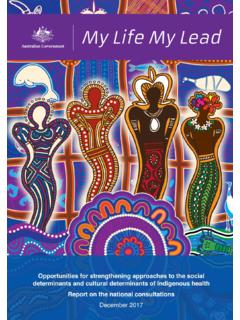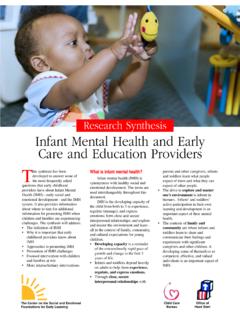Transcription of National practice standards for the mental health ...
1 National practice standards for the mental health workforce 2 0134 Clinical review of area mental health services 1997-2004 National practice standards for the mental health workforce 2 013 AcknowledgementThe revision of the National practice standards for the mental health workforce was funded by the Australian Government Department of by the Victorian Government Department of health , Melbourne, Victoria, on behalf of the Safety and Quality Partnership Standing document is available as a PDF on the internet at < >.The National practice standards for the mental health Workforce 2013 were endorsed by the mental health Drug and Alcohol Principal Committee. Copyright, State of Victoria, Department of health 2013 This publication is copyright, no part may be reproduced by any process except in accordance with the provisions of the Copyright Act and published by the Victorian Government, 50 Lonsdale St, 2013 (1310001)Acknowledgements 1 Preamble 3 Part 1.
2 Introduction 4 Background 4 History and scope 4 Purpose and audience 4 Review process 5 Language 5 mental health and involuntary care 6 National standards for mental health Services (2010) 6 Principles of Recovery-Oriented mental health practice 7 Alignment with complementary standards 7 Using the practice standards 8 Key principles 9 Part 2: Values and attitudes 10 Values 10 Attitudes 10 Part 3: National practice standards for the mental health workforce 2013 11 Overview 11 Standard 1: Rights, responsibilities, safety and privacy 12 Standard 2: Working with people, families and carers in recovery-focused ways 13 Standard 3: Meeting diverse needs 13 Standard 4.
3 Working with Aboriginal and Torres Strait Islander people, families and communities 14 Standard 5: Access 15 Standard 6: Individual planning 16 Standard 7: Treatment and support 17 Standard 8: Transitions in care 18 Standard 9: Integration and partnership 18 Standard 10: Quality improvement 19 Standard 11: Communication and information management 19 Standard 12: health promotion and prevention 20 Standard 13: Ethical practice and professional development responsibilities 20 Glossary 22 References and further reading 26 Contents 1We would like to thank the following people for their assistance with this project:Mr Etienne ScheepersChair, Project Steering Committee Executive Director, Workforce Innovation and Reform, health Workforce Australia Mr Marc ReynoldsChair, Expert Reference GroupManager Clinical Services Development, mental health Drug & Alcohol Office, New South Wales Ministry of HealthDr Lisa Brophy Director, Research Mind Australia and Senior research Fellow, The University of Melbourne, representing Australian Association of Social WorkersAssoc.
4 Prof. Kim Ryan CEO, Australian College of mental health Nurses Ms Carol Turnbull CEO, Adelaide Clinic, representing Australian Private Hospitals AssociationDr Peter Norrie Director of Clinical Services and Chief Psychiatrist, mental health , Justice health and Alcohol & Drug Services, Department of health , Australian Capital TerritoryMs Kali Paxinos Carer representative Ms Vrinda Edan Consumer expert, appointed by The National Register of mental health Consumers and Carers, MHCA Dr Murray Patton President Elect, Royal Australian and New Zealand College of PsychiatristsMs Joy Pennock National Professional Representation, Occupational Therapy Australia Dr Sabine Hammond Executive Manager, Science and Education, Australian Psychological Society Mr Harry Lovelock Executive Manager, Strategic Policy and Liaison, Australian Psychological Society Ms Paula ZylstraDirector, Private mental health Services, mental health & Drug Treatment Division, Australian Government Department of health and AgeingMs Robyn MilthorpeDirector, Quality Improvement, System Improvement Branch, mental health & Drug Treatment Division, Australian Government Department of health and AgeingMr Robin FlynnProject Manager, Workforce Innovation and Reform, health Workforce AustraliaMs Ellen CumberlandProject Manager, Workforce Innovation and Reform, health Workforce AustraliaMs Tina Smith Senior Policy Officer, Workforce Development, mental health Coordinating Council representing Community mental health AustraliaAssoc.
5 Prof. John Allan Chief Psychiatrist, mental health and Drug and Alcohol Office, New South Wales Ministry of HealthMs Tania Skippen Principal Program Advisor, Workforce Development, mental health and Drug & Alcohol Office, New South Wales Ministry of health Ms Amy Shearden Senior Policy Officer, mental health Clinical Policy, mental health and Drug & Alcohol Office, New South Wales Ministry of health Ms Frances PagdinGeneral Manager, Top End mental health Services Northern Territory Department of health Dr Leanne Geppert Acting Director, mental health Plan Implementation Unit Queensland HealthDr William KingswellActing Executive Director, mental health Alcohol and Other Drugs Directorate, Queensland HealthMr Mark ShaddockIndustry Partner, Training Packages, Community Services and health Industry Skills CouncilMs Dorothy RaoManager, Training Packages.
6 Community Services and health Industry Skills CouncilAcknowledgements2Ms Charmaine Redding Team Leader, Workforce Development Unit, Statewide and mental health Services, Department of health and Human Services, TasmaniaMs Catherine Schofield Director of Nursing, mental health , Department of health and Human Services, TasmaniaAssoc. Prof. Tracy Beaton Senior Nurse Advisor, mental health Drugs and Regions, Department of health VictoriaMs Deborah Nelson Executive Director of Nursing, South Metropolitan Area health Service, mental health Commission, Western Australia Ms Penny TolhurstSecretariat Manager mental health Workforce Advisory Committee SecretariatMs Simone TrembathSenior Project Officer mental health Workforce Advisory Committee SecretariatWe would also like to acknowledge the assistance of the mental health and Drug & Alcohol Office, New South Wales Ministry of health in developing these revised are also extended to the many individuals and groups who provided comments and feedback on earlier drafts of this document 3 Part 1.
7 IntroductionThe introduction introduces the practice standards , describes the history and the scope of the standards , and summarises the review process. The purpose of the practice standards and the target audience is explained, as is how the practice standards align with discipline-specific standards and the service 2: Values and attitudesThe values and attitudes underpin how mental health practitioners apply their skills and knowledge in their work with people, families, carers and communities. The values and attitudes on which all workers are expected to base their practice are detailed in this 3: practice standardsThese standards are relevant to all members of the five disciplines working in mental health settings. The 13 standards cover the range of common skills and ways of working required of practitioners in the mental health workforce.
8 Each standard includes indicators specifying how the required knowledge and skills must be applied to meet the required level of 4 BackgroundMental health services are an important part of the health system. At the centre of mental health service delivery is the engagement between the practitioner and the person using the service. While interventions such as biological and psychological treatments are important, empathy, understanding and expert knowledge are critical to successful governments are committed to supporting and developing the mental health workforce that provides services to people with mental illness, and their families and carers. People who work in mental health are among the major strengths of the system. Supporting practitioners to develop their skills, knowledge and attitudes is an important element of service quality and improvement.
9 It also contributes to worker satisfaction and retention. Working in mental health offers particular challenges and benefits, and the workforce has a vital role in improving health and social outcomes for the and scopeThis document is the successor to the National practice standards for the mental health Workforce (2002), which applied to the following professions: Nursing Occupational therapy Psychiatry Psychology Social National practice standards for the mental health workforce 2013 (the revised practice standards ) are intended to complement the discipline-specific practice standards or competencies of each of the professional groups, and to address the shared knowledge and skills required when working in an interdisciplinary mental health environment. They render explicit the shared capabilities that all mental health professionals should achieve in their work.
10 There have been considerable changes in mental health over the past 10 years, with increased service provision in the community, expansion of the non-government and private sectors, and greater focus on the role of the primary care sector in mental health . The practice standards apply to workers from the five disciplines in a range of healthcare settings including hospitals, community mental health services, and correctional facilities across metropolitan, regional and remote areas of Australia. These practitioners are engaged in public, private and non-government services. The practice standards relate to mental health practice across the lifespan including services for children, young people, adults and older disciplines and workers outside the five professions listed above are also an important part of the mental health workforce and may also find these revised practice standards and audienceThis revised set of standards is intended to strengthen the workforce and to outline the values, attitudes, knowledge and skills required when individual members of one of the five professions listed above work in a mental health service.

















